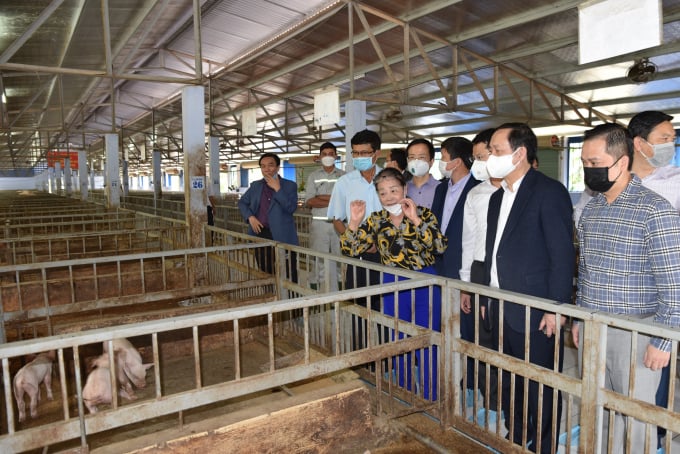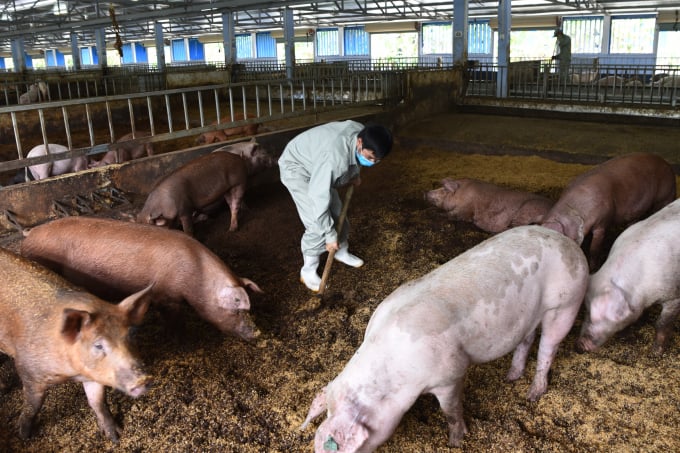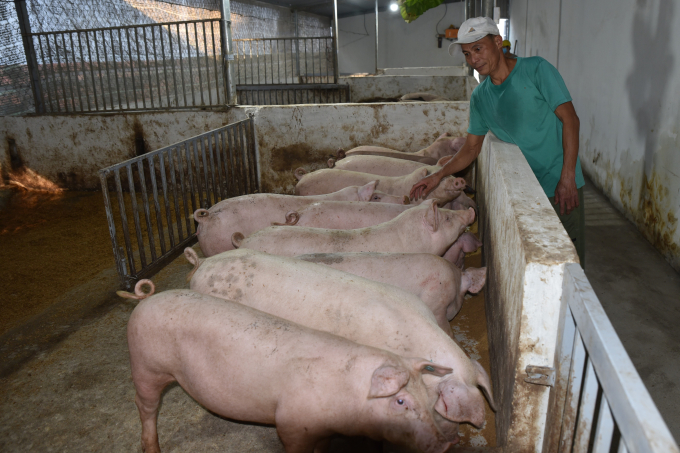May 16, 2025 | 09:55 GMT +7
May 16, 2025 | 09:55 GMT +7
Hotline: 0913.378.918
May 16, 2025 | 09:55 GMT +7
Hotline: 0913.378.918

Minister of Science and Technology Huynh Thanh Dat visits the livestock farming model using probiotics of Que Lam Group. Photo: Hoang Anh.
After years of research, Que Lam Group has come up with "the process of raising bio-safe pigs with probiotics" by using 403 Alfa Lacto and QL products to supplement feed and biological pads respectively.
These products have been licensed by the Ministry of Agriculture and Rural Development (MARD) since 2019, applying modern microbial technology that is completely innovative and different from current technologies. They help to handle the odor of pig manure from inside the animal's body and treat biological padding to improve the environment while providing a source of organic fertilizer for production.
Specifically, probiotic 403 Alfa Lacto is added to pig feed to provide additional lactobacillus microorganisms that inhibit intestinal pathogenic bacteria for livestock; enhance the production of natural antibiotics and the intestinal immune system; produce bacteriocin to control the proliferation of organisms that cause intestinal rot, ensure intestinal pH balance... Thus, when the animals discharge waste, the odor is limited.

Probiotic 403 Alfa Lacto treats both the bad smell of pig manure from inside the animal's body and the biological padding to improve the environment and create a source of organic fertilizer for production. Photo: Hoang Anh.
Meanwhile, probiotics to deodorize and rapidly decompose organic substances in livestock waste (QL) have been selected and added with microbial strains capable of deodorizing, antagonizing plant diseases such as lactic acid bacteria, yeast, Bacillus...
Together with microbial strains such as saccharomyces, Lactobacillus, microbial cell density of 109 cfu/g, QL product has improved the efficiency of processing raw materials rich in organic compounds, which are agricultural by-products and livestock waste, reducing the odor of livestock barns and protecting the environment.
Both of these products have been well researched by the Institute of Biotechnology Research and Application of Que Lam Group in the provincial project "Application of probiotics to deodorize barns and produce bio-organic fertilizers from livestock waste in Thua Thien - Hue Province" and its results have been certified.
According to the results of piloting the project in Thua Thien - Hue, the addition of 403 Alfa Lacto products to feed and bio-buffer in pig production has reduced diarrhea in piglets and significantly reduced odor compared with other models. The pigs raised within the project have gained an average weight of 18.7 kg/month, which has brought high economic efficiency.
Organic fertilizers produced from livestock by-products deployed by the project have met the standards of bio-organic fertilizers regulated by the MARD... The addition of 403 Alfa Lacto productions to feed and biological padding in raising breeding pigs resulted in animals with better resistance and less illness.
In particular, in the barns in which 403 Alfa Lacto products are used to supplement biological pads while water is not used to bathe the pigs and wash the barns, the smell has been managed. At the same time, both the amount of water and waste discharge into the environment have been minimized.

The biosafety breeding process of Que Lam Group is an effective solution of livestock farming. Photo: Hoang Anh.
According to Que Lam Group, the most distinctive innovation of this process is the application of modern microbial technology to treat odors in pig production both inside the pig's body and outside the barns while making the most of livestock waste to turn it into fertilizer.
In terms of economic efficiency, the project helps to save water resources as it does not require water to bathe pigs and clean the barns regularly. In addition to utilizing livestock waste, it has also reduced costs by more than 15%, bringing an average profit of VND 6-700,000/pig, an increase of 30-40% compared to previous livestock production.
The comparison results also show that the households that do not use biosafety breeding methods have faced a 100% pig mortality rate due to African swine fever since February 2019.
To those applying the project, the survival rate of their pigs is always 100%, and the analyzed meat samples are negative for African swine fever.
The process of applying technology in biosafety pig farming of Que Lam Group has created an effective value chain in terms of economic and environmental efficiency. It has been widely popularized by the MARD as the solution to livestock farming.
Translated by Phuong Ha

(VAN) Cold-barn systems efficiently manage environmental and temperature conditions, which aids in the prevention of respiratory diseases in pigs and protects them from the vectors that transmit African swine fevers.

(VAN) To tackle challenges, the project 'Addressing key technical bottlenecks in the grouper supply chain in Vietnam' has been underway since 2024.

(VAN) The project 'Disease-Resilient and Sustainable Cassava Production Systems in the Mekong Region', funded by the Australian Center for International Agricultural Research (ACIAR), is being implemented from 2024 to 2028.

(VAN) Data from 10,000 farming households will help professionalize production organization and support the implementation of the One Million Hectares Program for High-Quality, Low-Emission Rice Cultivation.

(VAN) FAO Director-General QU Dongyu marks International Day of Plant Health at NENA conference.

(VAN) Deputy Minister of Agriculture and Environment Hoang Trung affirmed that floriculture and ornamental plants are a growing industry that receives significant global attention.

(VAN) The three staple crops dominating modern diets – corn, rice and wheat – are familiar to Americans. However, fourth place is held by a dark horse: cassava.